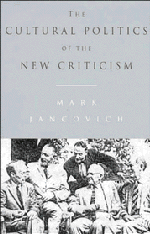Book contents
- Frontmatter
- Contents
- Preface
- List of abbreviations
- Part I The New Criticism and its critics
- Part II The formation of the New Criticism
- Part III The establishment of the New Criticism
- Introduction
- 7 The origins of academic involvement
- 8 Understanding literature: textbooks and the distribution of the New Criticism
- 9 The form of criticism
- Part IV The development of the New Criticism
- Conclusion: Modernism and postmodernism within the American academy
- Conclusion
- Notes
- Bibliography
- Index
9 - The form of criticism
Published online by Cambridge University Press: 18 December 2009
- Frontmatter
- Contents
- Preface
- List of abbreviations
- Part I The New Criticism and its critics
- Part II The formation of the New Criticism
- Part III The establishment of the New Criticism
- Introduction
- 7 The origins of academic involvement
- 8 Understanding literature: textbooks and the distribution of the New Criticism
- 9 The form of criticism
- Part IV The development of the New Criticism
- Conclusion: Modernism and postmodernism within the American academy
- Conclusion
- Notes
- Bibliography
- Index
Summary
Introduction
By the late 1930s, Ransom, Tate and Warren were deeply involved in the struggle to establish their approach to literary study within the academy. In the process, their approach came to be known simply as ‘criticism’ in contrast to other approaches such as philology or historical source hunting. Yet the essays from this period are often used as evidence that they lost an interest in the relationship between literature and society. As a result, it is necessary to re-examine the theoretical struggles within which they were engaged in order to illustrate both the political nature of their intervention within the academy, and their continued interest in the relationship between literature and society. During the late 1930s, as had been the case in earlier periods, these writers challenged the claims of positivism which they associated with capitalist relations, but their particular targets became the theories of the logical positivists and the scholastic methods employed by most of the professors of English. None the less, they were careful to point out that these two approaches were only symptoms of a larger problem – the positivism of modern society. As before, their arguments had two main themes. First, they claimed that the form of literary discourse was different from the form of scientific discourse; that its language was different and it offered a different type of knowledge. Second, they argued that the object of literary study should be the linguistic forms of literary discourse, not merely the accumulation of historical information.
- Type
- Chapter
- Information
- The Cultural Politics of the New Criticism , pp. 90 - 102Publisher: Cambridge University PressPrint publication year: 1993



